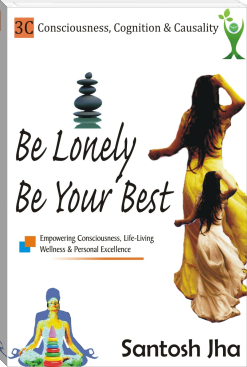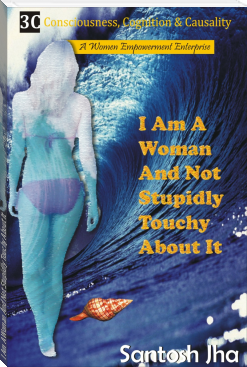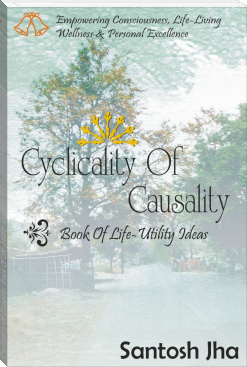Be Lonely, Be Your Best by Santosh Jha (good books to read for 12 year olds TXT) 📕

- Author: Santosh Jha
Book online «Be Lonely, Be Your Best by Santosh Jha (good books to read for 12 year olds TXT) 📕». Author Santosh Jha
We all know about epiphany moments of life-living experiences but very few of us actually live its magnanimous magnificence. Higher consciousness lands us with epiphanies of life and living. All endowments and attainments then become multidimensional, unleashing spectrum of true and everlasting happiness and satisfaction.
Loneliness, like sex is very misunderstood realism. Look, how all over the globe, so many people are being drawn to meditation. It is growingly being understood and accepted that larger humanity has never understood their drives well. It is now accepted that somehow, most of our life-living troubles emanate out of our poor handling of our instincts and drives. That is why our cultures are so cluttered and dysfunctional.
Globally, in many cultures, people are accepting the ancient wellness principle that humanity needs to redefine, redesign and reapply their drives of hunger, sex and social needs. And how to go about it? The primary requirement is addressing your higher consciousness. It is not easy for most in clutter culture as focusing on the self, which is in definitive self-control of all the sensory pulls and drives is a tough task. That is why for many, who find themselves cluttered, meditation extends a handy tool to start the journey inside.
In all cultures, we have had so many greats, who understood and accepted the importance of the joy of connecting to the real self. They could attain greatness only because they realized that primary task for everyone is to hit the poise within. They understood the importance of deep-rootedness of consciousness in a milieu, where self was addressed only to own self. In Indian spiritual traditions, especially in Yoga philosophy, meditation was emphasized for befriending the self. In other Oriental tradition, there is a word called Shikan Taza, which literally means ‘Just Sit’. These techniques are for empowering the consciousness by focusing on self, to internalize all joys and satisfaction within.
Therefore, it is important that we understand loneliness in a completely new light. We have to understand and accept that loneliness is your first intelligence, beckoning your drifted and fluxed consciousness to come out of it and start the journey of self-exploration. Most greats used this precarious energy of loneliness this way. Buddha was a king’s son and was raised in all worldly endowments, with all the material glitter, glam and indulgence intentionally made splattered around him. He was young, had a beautiful wife and a lovely son. Still, he felt loneliness in his world of drift and flux. This lonely feeling paved way for him to attain Nirvana.
He left everything. As there was no poise of purpose within him, he felt unease and more loneliness. He later discovered that world had grief and troubles but leaving the world and turning a saint was no solution. He realized that it was the poised mind, which was the solution of all grief and troubles. He advocated self-actualization of this poised being, which in modern scientific lexicon is called higher consciousness. Buddha’s life-living philosophy is a very contemporary need. In all eastern spiritual traditions, there is this emphasis on self-actualization. They insist that all realisms are within this poise mind or higher consciousness. Even God is within this mind consciousness.
We all have a Buddha within ourselves. Who is a Buddha? Buddha means the enlightened and empowered. Therefore, being Buddha means actualization of the potential of our conscious self, which is already there within us. This potential is dormant, or un-evolved, or untouched in most of us. Also, in all of us, there always happens a time and space, where we feel disenchanted with the world we live in and with the people we are surrounded with. As the scientists say, the very people and the very material consumptions, which make us thrilled and happy once, are the primary source of our disenchantment, heartbreaks and ultimately the loneliness. The Yoga philosophy said the same 3000 years back!
Therefore, loneliness feeling must be accepted as the clarion call of our own instincts to get ready for the ultimate journey of personal empowerment and self-actualization. It beckons to herald the process of making us Buddha – the enlightened one. Later, when we shall talk about homeostasis, we shall get to know the term set point. This is a biological term for a body facility, which is wired in our mind to make us return to our mean-wellness point. Being Buddha also somehow hints at being in the poise, the set-point of body-mind mechanism. This poise emotion is embedded deep within us. We miss this as we are not self-aware and in a drifted and fluxed consciousness.
Therefore, loneliness is a very positive and very beneficial mechanism in we all and it must be accepted this way. May be, it is our instinctive design that loneliness feeling has been drafted as the alarm bell, when our minds become too much cluttered to threaten our own wellness and beneficial survival. It may be like the alarm bell of your washing machine, which starts a loud beep alarm, when we overload it.
However, the prudent thing is, before this alarm bell rings, we all must be aware of the threshold of the mind consciousness to bear with this cultural clutter. Why wait for the alarm bell. Start the journey towards higher consciousness. Never commit the mistake of loading your washing machine with more clothes, if its overload alarm bell rings.
**
Reshape Cognition Of Emotions Of Reward And Rejection
To Get Nirvana From Causality Of Gain And Loss
In understanding loneliness in new light and designing it in a positive and beneficial way, we also need to talk about our mechanism of emotions. Science clearly says, you are as lonely as you think and feel you are. Therefore, it has to be accepted that our emotional state of consciousness has got much to do with how we accept ourselves as. Emotions and cognition are inter-dependent realism for us. That is why emotional poise is so crucial for wellness. We can hit the poise if we understand the mechanism of our emotions well.
We all need to understand why poise of emotions are important in our life-living wellness scheme of things. It is also very important to know why the primary emotions of reward and rejection must not be associated exclusively or predominantly with tangibles of life. We have to accept as why it is ideal to come out of this cognition of emotions of reward and rejection, to get final emancipation (nirvana) from this causality – this cyclicality of gain and loss, reward and rejection. This emotion of reward and rejection is at the core of loneliness feelings and that is why a detailed understanding of the emotional mechanism of our body-mind structures shall help us in a big way to deftly handle loneliness.
Not many of us feel comfortable to accept ourselves as one of the many species on earth. The reality however remains that humans are also a product of millions of years of evolution and we are also largely a bio-chemical mechanism. Most of our behaviours and actions are the complex handiwork of different bio-chemicals, which we know as hormones. Evolution, as scientists accept, is a stupid engineering. It does not seek excellence but orchestrates simple patch up work to engender a species and its mechanism to barely survive. Therefore, most of our workings are simple hormonal action-reaction mechanism. The primary hormones are of reward and rejection. We all are induced to an action or behaviour because of the emotion of reward and get retracted from something because of the emotion of rejection and punishment.
Science has now begun to understand the complex functioning of hormones and how they affect our moods, our action-behaviour and overall feeling of wellness. We do not have to go into the details of different hormones and their associated emotions. But we have to understand that emotions and hormones are associated with each other in a very intricate causality. Emotions are affected by external factors in milieus and they in turn affect the secretion of hormones. The affected hormones then impact the emotions in associated way, which makes us see external factors in the milieus in an affected way.
Though it is a complex issue, involving scientific explanations, here we just simply have to understand that emotions and feelings are different entities. Emotions involve tangible and physical elements, mostly from the external milieus, we interact with. Emotions involve physical change in the environment. You see something and here comes the emotion of fear. However, what our body-mind mechanism does in response to the emotions come in the form of intangible and is known as feelings. The emotions and resultant feelings are also in a subjective causality, as they involve two different elements of tangible as well as intangible. This causality itself is very interesting and is an outcome of the causality between emotions and hormones.
For example, you once loved a person but off late, you have some troubles with that person. So, may be, when that person says something, and as you do not feel rewarded in his or her company anymore, you shall doubt his or her intentions in whatever he or she says. The words may be innocuous or even well-meant for you but as the emotion is under the influence of the feelings of doubt, you may experience unease about it. Therefore, your emotion of reward or rejection may shape and colour the factors in the external milieus. This emotion actually changes your cognition and this in turn changes the causality.
We have known earlier that scientists define loneliness subjectively, saying that you consider yourself as lonely as you feel. This feeling of loneliness is subjective because it is an outcome of the emotions you are in. When scientists insist that loneliness must be seen as an interior, subjective experience, not an external, objective condition, they wish to put the idea to the fore that your subjective emotions decide your cognition and causality, which in turn impacts your consciousness. That is why we are putting so much importance on the emotional scale on which you are. Understanding our emotions and how our hormonal mechanism impacts us can help us master the art to handle loneliness in an empowered way.
Now that we accept how important emotions are for our wellness and how hormones work in a stupid cyclicality, presiding over much of what we act and behave; we can design our life-living spheres in such a way that we remain in a perpetual state of emotional poise. We surely can rise above the cyclicality which hormones, emotions and external milieus work on us, affecting our consciousness, cognition and causality.
It is not that only modern science has made us know and accept all these. More than three thousand years back, the wise of humanity had understood that matters or any tangible entity in the external milieus have very little to do with our wellness and happiness. What mattered was the internal emotional state. There are so many intangible aspects within, which make us accept things which are tangible, in happy ways. Faith, affection, compassion, sense of mutuality, intimacy, etc are intangibles, elements of emotions, which make us accept all things tangible in external milieus positively. If we have trust, love and compassion for a person, he or she shall be in our wellness scheme of things and his or her company shall be rewarding for us. We then happily forgive and forget, even if that





Comments (0)